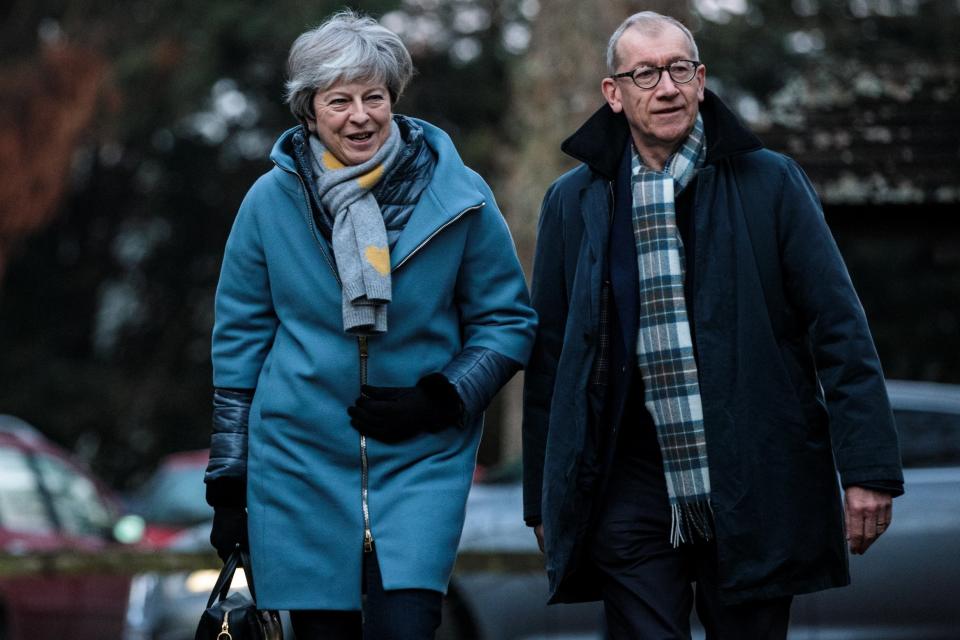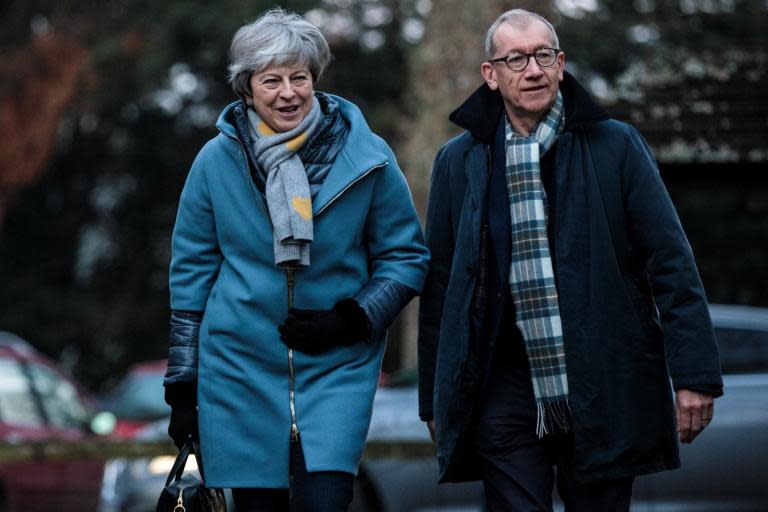Brexit news latest: Theresa May to set out 'plan B'
Theresa May is to set out her 'Plan B' for Brexit this afternoon after cross-party talks fell flat.
It is believed she will try to resolve concerns over the sticking point of the Irish backstop, aimed at avoiding a hard border in Ireland.
However, it is not clear how she intends to achieve this.
According to the Telegraph, Mrs May told the Cabinet her plan was to do "something" on the backstop. Asked if it was something specific or just "anything," she is reported to have said "the latter."
Following the crushing defeat of her agreement with Brussels, the Prime Minister will make oral and written statements to the House explaining how she intends to proceed.
She will also table a "neutral" motion today that will be debated and voted on, along with any amendments tabled by MPs, on January 29.
What's happening? Brexit at a glance
Cross-party talks 'end without agreement'
Despite efforts to bridge the Brexit divide between the party leaders last week, there is no sign yet that Theresa May is prepared to scrub out her red lines. The Prime Minister is required to update MPs on her "Plan B" in the Commons on Monday. However reports suggest she intends to instead press on with attempts to win over her own MPs and the Democratic Unionist Party by assuaging objections to the Irish backstop - aka Plan A.
Brexiteer shift?
The PM met with a group of Brexiteer former ministers on Thursday. Attendee John Whittingdale said it had been a "constructive meeting" and he was convinced an agreement that satisfies a majority of Tories and DUP remained possible. Meanwhile Jacob Rees-Mogg, chairman of the European Research Group of Brexiteer MPs, has signalled that he may ultimately choose to support Mrs May's deal. Writing in the Mail on Sunday the leading Eurosceptic said that in a choice between the withdrawal agreement and no Brexit he would back her deal.
DUP on side?
Leader Arlene Foster and her deputy Nigel Dodds also visited Downing Street for talks last week. Mrs Foster said the issue of the Irish backstop needed to be dealt with "in a very clear way". Mr Dodds said the details on how progress could be made were being discussed but that it was not "useful to give too much of a running comment on the details".
Labour attacks "appeasement" strategy
Jeremy Corbyn refused to meet with the PM unless she took "no deal" off the table. After she stood firm he branded it a "empty and hugely expensive" threat that was wasting billions of pounds of public money. "It's a pointless and damaging attempt to appease a faction in her own party when she now needs to reach out to overcome this crisis," he said.
Backbenchers in motion
Mrs May will table a "neutral motion" on Monday and backbenchers are expected to table a series of amendments. One seeks to give time for a bill to suspend the Article 50 withdrawal process if there is no new deal with Brussels by the end of February. Another would allow a motion by a minority of 300 MPs - from at least five parties and including 10 Tories - to be debated as the first item of Commons business the next day.
Brexiteer concerns over Commons "hijacking" referendum
The backbenchers' manoeuvres could also explain a softening of opposition to Mrs May's deal among Brexiteer MPs. On Sunday leading Brexiteer Liam Fox, the International Trade Secretary, accused pro-Remain MPs of trying to "hijack" the 2016 referendum vote. Downing Street said it is "extremely concerned" by the backbenchers' moves.
Another week to save her deal?
Despite suffering a historic defeat for her deal last Tuesday, Mrs May appears to be pushing ahead with efforts to win over enough MPs to get it through. That would mean placating the opposition of nearly 120 Tory MPs and the DUP. The bill will be debated and voted on - along with any amendments tabled by MPs - on January 29. Britain is scheduled to leave the EU on March 29.
Government sources said she would be holding further talks with MPs, as well as business leaders and trade unionists, throughout the week in an attempt to find a way forward.
But after she briefed the Cabinet in a conference call on Sunday about her first round of cross-party contacts last week, there was little expectation she was ready to offer concessions that could win over opposition MPs.
Instead reports suggested she was preparing to press for changes to the Northern Ireland backstop in the hope she can win round Tory Brexiteers and her allies in the DUP who voted against her original deal.
The Telegraph also reported she was even considering trying to amend the Good Friday Agreement - although the paper quoted senior sources as saying the idea was a "non-starter".
Irish foreign minister Simon Coveney was adamant over the weekend the backstop - intended to ensure there is no hard border between Northern Ireland and the Republic - was an essential part of the Withdrawal Agreement.
However there were signs some Brexiteers could reluctantly back Mrs May's deal amid concerns a cross-party grouping of MPs are plotting to impose a "softer" Brexit - or derail it altogether.
Writing in The Mail on Sunday, leading Tory Brexiteer Jacob Rees-Mogg said: "Even Mrs May's deal would be better than not leaving at all."
There was anger among pro-Leave MPs at moves to enable backbenchers to take control of the Commons business from the Government - in breach of normal conventions - through a series of amendments to the neutral motion.
One group including senior Labour MP Yvette Cooper and Tory former minister Nick Boles is seeking to give time for a bill to suspend the Article 50 withdrawal process if there is no new deal with Brussels by the end of February.
Another more radical amendment drawn up by former attorney general Dominic Grieve would allow a motion by a minority of 300 MPs - from at least five parties and including 10 Tories - to be debated as the first item of Commons business the next day.
Mr Grieve said it would enable the Commons to stage a series of "indicative votes" on the various alternatives, such as a "soft" Norway-style deal or a second referendum to establish which could command a majority.
He denied claims he was seeking to prevent Britain leaving the EU after International Trade Secretary Liam Fox accused pro-Remain MPs of trying to "hijack" the 2016 referendum vote.
Mrs May is expected to use her statement to explain how she intends to proceed in the run up to the vote on January 29, rather than setting out a detailed "plan B".
Labour leader Jeremy Corbyn hit out at the Prime Minister for stymieing attempts to find a cross-party consensus through her refusal to rule out a no-deal Brexit.
"May's no-deal threat is empty and hugely expensive, wasting billions of pounds we should be spending on vital public services," he said.
"It's a pointless and damaging attempt to appease a faction in her own party when she now needs to reach out to overcome this crisis.
"If the Prime Minister is serious about finding a solution that can command support in Parliament and bring our country together, she must listen to the majority of MPs, as well as members of her own cabinet, and take no-deal off the table."
The SNP's Westminster leader Ian Blackford MP said: "Rather than listening to other options the Prime Minister is instead closing them down, intent on cutting off any alternatives and leaving a false choice between her defeated dead deal and a disastrous no-deal."
"It would be the height of irresponsibility and economic self-harm if Theresa May does not categorically rule out a no-deal Brexit today. Her attempt to run down the clock must be stopped."
Additional reporting by PA

 Yahoo News
Yahoo News 

